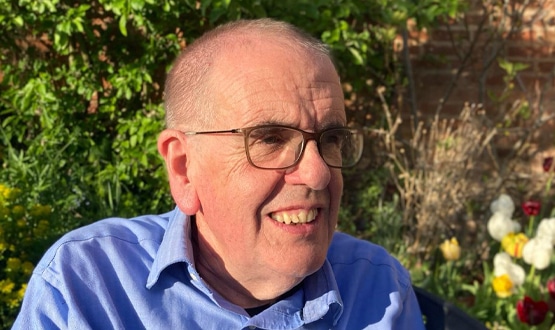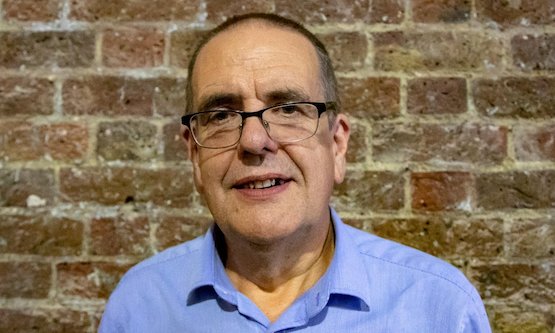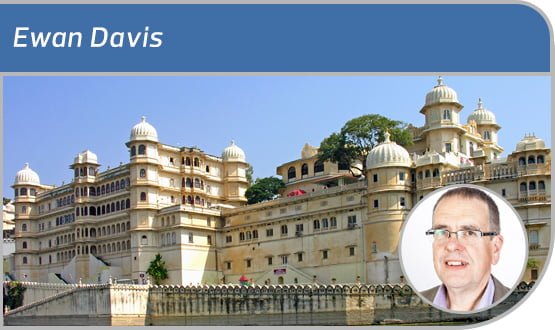UK health IT community loses one of its brightest and warmest stars
- 7 March 2024

Ewan Davis, 1955-2024
Ewan Davis, one of the most original and influential thinkers in UK health IT, particularly on primary care and open platforms, passed away suddenly last month.
His many industry friends and former colleagues spoke of his remarkable kindness and generosity, helping many begin and develop their careers in the sector, and described him as a great friend who will be greatly missed.
His was a remarkable career that encompassed founding what became Meditel, later AAH Meditel, to become one of the leading primary care IT suppliers; playing an influential role in the National Programme for IT in the early 2000s; and then going on to become an international thought leader among those seeking to address the challenges of meaningful health interoperability through open platforms.
“He’s been hugely practically influential; he’s done a lot of stuff. But what really stood out was his kindness and I’m discovering just how many people he helped out,” said friend and colleague Dr Ian McNicol.
“Ewan would say ‘I’ll give you everything I know, 90% will be bullshit and 10% will be gold. The problem is I don’t know which is which’.”
Ewan was also a great friend to Digital Health, bringing his insight and expertise to the board as a non-executive, this despite confidently predicting the end of trade shows like Rewired for the past decade.
“He was more of a mentor than a boss. He would always lead from the front and from the heart, with a conviction that everything we did should be for the greater good,” said Prof Michael Bainbridge, friend and Meditel colleague, speaking from Sydney.
“Ewan was the best boss you could ever have a beer with”, he added. Warm memories of spending time with Ewan in a pub putting the world to rights over a few beers was a common theme of tributes on Linkedin.
Ewan was born 7 May 1955 to modest means in Hammersmith Hospital, London, the son of Jenny and Wally, who moved to Derbyshire when Ewan was just six months old. His father Wally, a life-long trade-unionist who rose to the national executive of the Medical Practitioners Union and later set-up BOMPA (Bureau of Medical Practitioner Affairs), a left-leaning think tank and publisher, was a massive influence.
The family later relocated to the Midlands, but after a visit back to London as a four-year-old, Ewan built a complex replica with pulleys and developed a life-long obsession with Tube trains. An obsession passed on to his daughter Iona. Ewan later became an enthusiastic adopter of Boris Bikes in London, often showing up to meetings in a hi-vis vest and bike helmet.
Ewan attended Birmingham University, studying physics, in between organising rent strikes and learning to code (not part of his course). In 1974, he and a couple of friends organised a party where they invited 500 women from Mason Hall but neglected to invite any other guys. One of the guests was his future wife, Alison.
After Birmingham Ewan worked for Shelter, the Department of Employment, and did a spell on Beacon Radio and wrote a column for the Sandwell Mail.
He eventually joined BOMPA. This early experience provided Ewan with a deep insight into what made GPs tick, which was to serve him well throughout his career.
Then in 1981, encouraged by Wally, Ewan launched Meditel, one of the first primary care information systems. Along the way, Ewan later recalled, he “discovered GP computing and spent much time trying to raise money for a mad scheme to give GP free computers in return for anonymised patient data and make himself fabulously rich”.
The company came very close to failing, but after securing investment AAH Meditel was established. By 1989, it had 1000 practices and the company had grown from eight to 250 people.
Ewan married Alison, by now a consultant clinical psychologist, in 1985; their first child Silas arrived the same year, followed by Iona in 1989.
Ewan rose to prominence as part of the tight-knit band of innovators, including the likes of Dr David Stables, Dr Peter Sowerby, Tim Benson and Dr Mike Robinson, who blazed a path in the incredibly creative blossoming of primary care IT in the 80’s and early 90s. A period that saw remarkable progress in GP computing.
Crucially, Ewan also played a huge role in getting people involved, who would later go on to become leading lights in the field, like Dr Mike Bainbridge, Dr Nick Booth and Dr Glyn Hayes. He also become a chair and leading figure of the British Computer Society’s Primary Health Care Specialist Group (PHCSG).
It was an era in which there was close co-operation between ostensible competitors in primary care IT systems, companies now largely consigned to history, including Vamp, AAH Meditel and EMIS. Ewan was part of that era of consolidation, leading the sale of AAH Meditel to Torex in 1999, itself later acquired by the then bright hope of UK health IT, iSoft, in 2003.
After AAH Meditel Ewan, moved to consulting, recalling in a 2014 biographic note, “Alison had set up Woodcote Consulting and she allowed Ewan to join as junior partner, and this is where he remains today“.
Ewan later tried to be a positive influence, informing the NHS National Programme for IT (NPfIT) juggernaut from within BT.
Dr Nick Booth, a friend and colleague, remembers that at the BT job interview, involving the top boss, they didn’t get past the first question as Ewan gave such a detailed and insightful response.
The years following NPfIT proved a particularly creative new chapter, in which Ewan became one of the founders of the NHS Open Source programme, Code4Health, with Peter Coates and other.
Although the formal Code4Health didn’t last long, it proved extremely influential. Peter recalls that Apperta, the name for the successor organisation, was coined in Ewan’s kitchen late in the evening of his sixtieth birthday party.
In 2012 Ewan set up HANDI with Iona and others as a not-for-profit company to support health and care app developers. He also became an active early member of the NHS Hackday community.
Dr Marcus Baw recalls first encountering Ewan. “He was a real mentor to me. I met him at the second NHS Hackday in Liverpool in 2012 and immediately formed OpenGPSoc [an initiative advocating for an open GP system] immediately afterwards.”
Dr Wai Keong Wong, meanwhile, said: I think Ewan will be most remembered as the ultimate connector of people. His generosity, enthusiasm and curiosity knew no bounds. Our field, our community, have lost one of its shining stars but his spirit will no doubt live on within many of us.”
Fast forward a few years and Ewan had decided that the key was to focus on open platforms. With friend and colleague Dr Ian McNicol he founded Inidus, a start-up focused on developing open platforms and interoperability across health. Ultimately, they found they were just a bit too old for the profile investors were looking for, but had fun as the oldest hipsters in the London start-up scene.
“We were too early and too old,” said Ian. “The old guys amongst all these kids.”
But though Inidus failed to achieve its goals, the ideas behind it – that only through truly open platforms can the knotty challenges of interoperability and citizen-centred care be achieved – have proved enduring.
One of Ewan’s most lasting contributions was writing ‘Defining an Open Platform’, which provided a literal blueprint for OpenEHR and FHIR and SNOMED, adopted by countries and regions like Catalonia, and which has informed the London shared records programme.
As well as addressing interoperability problems, by moving to open platforms it becomes possible to have truly co-produced health records, “Once you’ve gone down open platforms you open up the potential for patients to be invited in as fellow professionals,” said Ian.
Peter remembers Ewan saying of his work on open platforms, “The stuff that we are doing here on open platform I won’t see the benefit of in my lifetime, but hopefully my kids will.”
Ewan is survived by his wife Alison, his children Silas and Iona, and grand-daughters Fallon and Athena, who he dearly loved and spent a lot of time with, in Ibiza.
The family has set up a memorial fundraiser for Medicins Sans Frontiers.





10 Comments
Ewan was an English gentleman, a direct no nonsense talker with a sharp sense of humor who spoke truth to power. We met when he already had a great insight into the health IT industry and all its strengths and weaknesses. He soon called out in no uncertain terms about the deep dysfunction within the industry and the need for real, deep and meaningful change.
He was a leader whose work gathered momentum through his passion, vision and mission around an open platform push in healthcare. The Apperta Foundation then enabled that leadership further as his ideas became defined in black and white in the “Defining an Open Platform” paper. History will in time remember Ewan as the primary author of a landmark paper that has helped define the move of health IT out of the information Dark Ages and into the 21st century future it so clearly needs. The clear and lucid way that he explains the open platform of the future in healthcare will stand the test of time. People will look back on his leading work as brave and insightful and important at a time when others were losing direction and didn’t know which way to turn.
I’m very honored to have been a colleague on a short part of that journey with him.
Ewan you will be deeply missed.
A fabulous tribute to a fabulous man. Always supportive of those trying to follow in his big-thinking footsteps. Such a genuine man. Very sorry to see him leave us…..
What a touching obituary, so many of us have been inspired by Ewan over the past decades, he was frank, honest, funny and led with his heart.
This obituary has summed up the Ewan I knew very well. Above all he was a connector, at which he was superb. He would listen to everyone (the wise and the unwise) and so made the odd error along the way. I got to know him in the early 1980s. Meditel was the only Abies reseller to sell to more than one practice. When he combined with AAH to launch AAH Meditel he chose our software, which took us all into a new league with Problem-Oriented Consulting-room based systems, comprehensive coding (Read Codes) and the Reqirements for Accreditation (which killed most innovation). He has passed on much too young.
Evan was extraordinary soul who freely gave of his time, ideas and guidance. It was exhilarating how much he would cover in a single meeting over tea. Thank you Ewan for all your inspiration and warmth. A champion of open platforms, ( which he believed was better than open source), of community systems instead of individual silos of automation, he forever changed my perception of what is truly possible. Many of your cherished goals are still alive in my organisation and the many programs that I continue to build across India.
My condolences and best wishes to the family
Ewan’s ideas and mentorship have been incredibly important to me. I was asked to present by Peter the same day that Apperta launched the Open Platform document, and that was the first of several occasions when I realised I was not coming out with anything new. All of my ideas on how ‘open’ could apply to healthcare had already been considered by Ewan! Over the years, and my interactions with him, Ian and Hildi I realised how truly groundbreaking he was.
He will be sorely missed and was a pioneer in doing things far, far better than before.
I initially worked for Ewan at Meditel, and left when he did. We remained friends, and Ewan was instrumental in my involvement with BCS Phcsg, and later with Handi. He was always supportive, encouraging and never too busy to give advice when I needed it. A generous, kind man with a wonderful sense of humour, that made me laugh and I will miss him. My thoughts are with his family at this sad time.
Fond memories of Ewan. Thank you for the obituary. As a fellow founder, does anyone remember British Medical Television. In age before Startups, Product Market Fit. My condolences and best wishes to the family.
It was my privilege to spend a week with Ewan in a ski resort. He didn’t ski but we had the pleasure of his wit and wisdom. I don’t think I ever laughed so much or learned so much in any other week of my life. Courageous, funny and kind. Sorely missed.
Thank you so much for this wonderful obituary, we miss him so much.
Comments are closed.